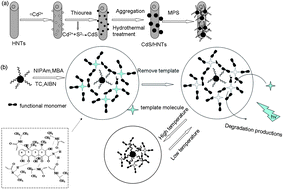Synthesis of thermal-responsive photocatalysts by surface molecular imprinting for selective degradation of tetracycline
Abstract
A novel thermal-responsive surface molecular imprinted photocatalyst of poly(N-isopropylacrylamide) (PNIPAm) modified CdS/halloysite nanotubes (HNTs) was prepared using surface molecular imprinting technology and evaluated as a potential effective photocatalyst for selectively remove tetracycline (TC) existing in aquatic environments. Free radical polymerization of TC, NIPAm, N,N′-methylenebisacrylamide (MBA) and 2,2′-azobisisobutyronitrile (AIBN) was used as a molecular template, functional monomer, cross-linking agent and initiator, respectively. The imprinted photocatalysts were further characterized by SEM, EDS, TEM, UV-vis DRS, FT-IR, BET and TG, which showed that the CdS/HNTs were successfully imprinted with PNIPAm. In addition, benefiting from the common effect of the specific binding of imprinted polymers, thermo-responsiveness of PNIPAm shells, and high photocatalytic activity of CdS/HNTs cores, the obtained material showed high photocatalytic activity and excellent selectivity to remove molecular template TC and the photocatalytic activity could be tuned by changing the environmental temperature. According to our experimental and characterized results, the mechanism of the preparation of imprinted photocatalyst and its use in photocatalytic degradation was further discussed, respectively.


 Please wait while we load your content...
Please wait while we load your content...